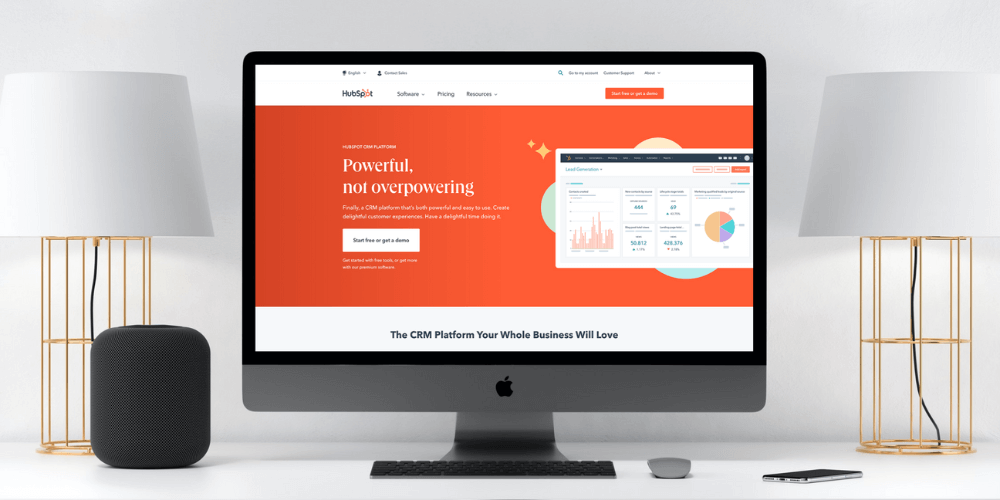Mel is our Partner Strategy & Delivery Manager and also a CIM Chartered Marketer, a testament to her commitment to excellence in the field. But Mel’s contributions don’t stop at the office door. Beyond her professional endeavours, she leads an active life as a qualified run leader and dedicated volunteer. Her experience in these roles has streamlined her leadership and teamwork skills, making her an invaluable asset when it comes to collaborating on projects and ensuring their success. Her sharp insights, strategic thinking, and knowledge have made her a backbone in our team’s ability to drive results for clients in this industry. Mel will make sure that we can approach marketing challenges from all angles and deliver outstanding results for our clients.
Posted on 29/09/2022 by Melanie Comerford
Introducing The Power of Marketing Automation
The face of marketing as we know it is currently undergoing a seismic shift. We can no longer rely on throwing content out into the void and crossing our fingers in the hope that a customer might make a purchase. At a time when consumers’ and businesses’ finances are being pinched, we as marketers must rise to this very real challenge. Luckily though, we’ve got just the tool that can support you in navigating this financially irregular period.
When you look at businesses as a whole, the majority share one goal and one associated challenge; generating high-quality leads. Attracting new customers and retaining their attention through to purchase is a fundamental challenge for brands all across the globe. Fortunately, marketing automation is here to streamline and accelerate this process. According to a recent survey from HubSpot, 78% of media planners are utilising marketing automation, with 26% of the companies who aren’t, are planning on doing so. In the same report, 43% of marketers agree that automation has been the most effective trend for their organization’s growth.
Let’s find out why…
What is Marketing Automation?
By definition, marketing automation is the utilisation of software and technology to simplify or automate a variety of activities.
Marketing automation is purposefully designed to help take the strain off your internal resources by automating monotonous marketing tasks. In addition to providing various shortcuts in completing time-consuming tasks, these marketing automation tools can also support you in providing more personalised experiences for your customers.
Many people assume that the term ‘marketing automation’ is the same as ‘email automation’ but that isn’t quite true. Although marketing automation does encompass automated communications via email, it also does much more. Modern marketing automation tech harnesses the full power and potential of data to influence your leads through their buyer’s journey. Something that even big businesses still struggle with to this day.
With the right marketing automation software (something we’ll cover more in-depth later), your business can save time, improve its organisation and convert more leads into paying customers. A big game changer for big and smaller businesses in both B2B and B2C markets.
How does Marketing Automation work?
So how does it work? Well, we all have those evergrowing lists of manual, repetitive and sometimes tedious tasks. These tasks are often relatively straightforward, but time-consuming, a resource that us marketers are already pretty short on. Marketing automation helps to remove these distractions from our to-do lists and enables us to focus on bigger impact initiatives.
Whilst marketing automation strategies will be different for every organisation, many of them will share some similar steps.
A marketing automation strategy is typically constructed of the following:
- Landing pages
- Chaflows/chatbots
- Email marketing
In addition to these lead nurturing tactics, there are often various other small tasks going on in the background. From automatically generating meetings and reminders to sending follow-up communications. All of which will have the potential to save your business time.

Whilst your automation strategy might start small, it will evolve into a sophisticated process that encourages your users to take action when they are ready to do so. Modern marketing is all about providing value to your prospects because over time, this value will be reciprocated in the form of a purchase.
One thing to bear in mind is that marketing automation is not a function you should set up and forget about. This is a common myth that unfortunately many believe. In order for your marketing automation strategy to generate the best results, it requires consistent monitoring and development. You must remember that automation is here to support your marketing, not do it all for you.
Marketing Automation vs Customer Relationship Management
Although CRM platforms and marketing automation may seem similar at first, they both serve a unique set of purposes. This may or may not be completely new information to you but it’s important that we differentiate the two. Obviously, we cannot speak for all CRMs or all automation tools so bear in mind we’re speaking generically.
So a Customer Relationship Management system helps businesses store, monitor and easily track communications with their leads and customers. A CRM is a go-to platform for collecting and connecting data from your leads and customers, whilst keeping it accessible to people across an organisation. Most CRMs are primarily sales-focused, with a key emphasis on the buyer stages that precede becoming an MQL (marketing-qualified lead).
The main purpose of a CRM is to improve the overall customer experience and increase sales, something that is shared with marketing automation.
Although the two tools may share similar objectives, they predominantly target two segments of users; non-sales ready and sales-ready. As we’ve outlined already, your CRM will focus on the leads who have been qualified by your sales team and are sales-ready. Marketing automation on the other hand will focus on those users who are yet to enter or are in the early stages of their buyer’s journey ie. non-sales ready.
Marketing automation software or tools are designed to let you track and influence a prospect’s ‘top-of-the-funnel’ actions. From submitting a form or opening an email, your marketing automation strategy can help organise and schedule the next action until a goal is achieved.
Today, many CRMs, like the HubSpot CRM have already integrated marketing automation tools within their systems, helping you unlock the full potential of both tools.

Top Benefits of Implementing Marketing Automation
Now that we’ve successfully explored what exactly marketing automation is, now we can walk you through some of the benefits of implementing these tools yourself.
Building Valuable Relationships
Modern digital marketing is all about building and nurturing long-lasting relationships with your prospects, leads and customers. Marketing automation empowers businesses like yours to create and deploy a customer-centric strategy that is hyper-personalised.
With automated marketing, your business can send the right messages to the right pool of users at the right time, improving the relevancy of your content. A recent survey suggests that 80% of customers are more likely to purchase from brands that offer customised and relevant experiences.
Remember marketing automation shouldn’t just be about what it can do for your business, but how it can support your customers. Your prospects, leads and customers are likely inundated with content, most of which they don’t want. Marketing automation helps you address your audience’s needs, challenges and goals and communicate messages that are aligned with this.
Effective Lead Nurturing
With marketing automation, you can set up actions and workflows that trigger once a user has met certain criteria or taken a specific action.
All too often we hear brands complain about cart abandonment or lost activity. With marketing automation, providing you have the right credentials, you can send hyper-personalised messages that can influence the close of the sale. This would work best for impulse or smaller purchases.
For more elongated buyer journeys, marketing automation can handle your sales follow-ups for you. Nurturing your leads can be a challenging and time-consuming process, but the result will be worth the wait. According to recent research, 50% of qualified leads are not yet ready to buy, making a lead nurturing programme even more crucial.
With automation, you can create and send non-disruptive content to your contacts that help edge them closer to purchase, or booking a consultation for example. There are various tools at your disposal; whether that be email, website personalisation or re-targeting. All of these tactics can work cohesively to facilitate your inbound marketing strategy.
Analysing the Buyer’s Journey
With marketing automation, you can unlock an entirely new perspective that can help you understand your customers and their buyer’s journey. By utilising marketing automation technology, you’ll be collecting more data that will enable your business to make smarter decisions. Even decisions that are away from marketing.
This tech will empower your brand to effortlessly embrace ‘big data’. Depending on your tool of choice, many platforms will enable you to review data and analytics all from one place. They are a comprehensive solution for measuring campaigns and forecasting consumer behaviour, again, something that will direct your decision-making.
In addition to simply reviewing the analytics, with many marketing automation tools you can create your own A/B or split tests to discover optimal channels and content. Supporting your business to fully comprehend how your sales and marketing initiatives are influencing your brand’s bottom line.

Aligning Marketing & Sales
It’s so secret that in the majority of businesses, particularly in big business, marketing and sales teams don’t often see eye to eye. This misalignment is commonly caused by outdated or broken processes that essentially stop these teams from communicating properly. With marketing automation collaboration is key, your teams will be compelled to re-align their goals in order to create the strongest strategy.
Your sales team can provide highly valuable insights into customers’ needs and wants at different stages throughout their buying journey. With the help of those insights, you can create targeted content for prospects that aims to offer education or solutions to their questions and challenges. By joining forces, marketing and sales can provide information that attracts leads, increases conversions, and delight your customers.
Improving Your ROI
This one sort of goes without saying. If marketing automation can help achieve all of the above, it’ll undoubtedly have an impact on your business’s return on investment. Automation technology can help your teams manage and communicate with their leads more efficiently. This will over time bolster conversion rates and increase your company’s revenue.
Marketing Automation at Loop Digital
At Loop Digital we love to utilise new and emerging technologies and marketing automation is a great example. We’ve been able to unlock the full potential of our marketing by leveraging the power of automation. Our multifaceted team have the skills and knowledge to deliver powerful marketing strategies and exceptional results.
For more information about how your business can benefit from marketing automation get in touch with our wonderful team today.
Looking for your next opportunity?
Digital marketing careers
We’re always on the lookout for talented individuals to join our ever growing team. If you think you’d be a great match for Loop Digital, we’d love to hear from you.

Join 300+ business owners getting weekly growth strategies - subscribe now.
"*" indicates required fields






